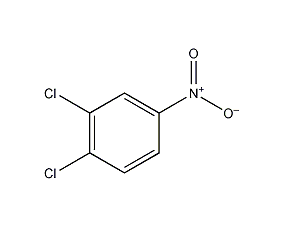
Structural formula
| Business number | 02FY |
|---|---|
| Molecular formula | Cl2C6H3NO2 |
| Molecular weight | 192 |
| label |
3,4-Dichloronitrobenzene, 1,2-Dichloro-4-nitrobenzene, 3,4-Dichloronitrobenzene, 3,4-Dcnb, dcnb, Asym.-nitro-o-dichlorobenzene |
Numbering system
CAS number:99-54-7
MDL number:MFCD00007207
EINECS number:202-764-2
RTECS number:CZ5250000
BRN number:1818163
PubChem number:24861969
Physical property data
1. Properties: needle-like crystals.
2. Density (g/mL, 20℃): 1.46
3. Relative vapor density (g/mL, air=1): Undetermined
4. Melting point (ºC): 43
5. Boiling point (ºC, normal pressure): 255-256
6. Boiling point (ºC, kPa): Undetermined
7. Refractive index: Undetermined
8. Flash point (ºC): 123
9. Specific rotation (º): Undetermined
10. Autoignition point or ignition temperature (ºC): Not determined
11. Vapor pressure (mmHg, 20.2ºC): Not determined
12. Saturated vapor pressure (kPa , ºC): Undetermined
13. Heat of combustion (KJ/mol): Undetermined
14. Critical temperature (ºC): Undetermined
15 . Critical pressure (KPa): Undetermined
16. Log value of oil-water (octanol/water) distribution coefficient: Undetermined
17. Explosion upper limit (%, V/V ): Undetermined
18. Lower explosion limit (%, V/V): Undetermined
19. Solubility: Insoluble in water, soluble in hot ethanol and ether.
Toxicological data
1. Skin/eye irritation: Standard Dresser test: rabbit skin contact, 500mg/24HREACTION SEVERITY, mild reaction; Standard Dresser test: rabbit eye contact, 100mg/24HREACTION SEVERITY, moderate reaction; 2. Acute toxicity: large Rat oral LD50: 953mg/kg; Rat inhalation LC50: 10mg/m3/4H; Rat peritoneal cavity LD50: 400mg/kg; Mouse oral LD50: 1384mg/kg; Mouse peritoneal cavity LD50: 400 mg/kg; Cat skin contact LD50: 790mg/kg; Rabbit skin contact LD: >200mg/kg; Guinea pig oral LD50: 500mg/kg; 3. Other multi-dose toxicity: rat inhalation TCLo: 10mg/m3/4H/17W- I; Mice inhaled TCLo: 28mg/m3/4H/21D-I; 4. Mutagenicity: Mutant microbial test: bacteria – Salmonella typhimurium, 250μg/plate; Sex chromosome loss and non-disjunction test: insect – Melanogaster Flies, 200 ppm;
Ecological data
This substance is harmful to the environment, and special attention should be paid to the pollution of water bodies.
Molecular structure data
1. Molar refractive index: 42.58
2. Molar volume (cm3/mol): 125.1
3. Isotonic specific volume (90.2K ): 334.4
4. Surface tension (dyne/cm): 50.9
5. Dielectric constant:
6. Dipole moment (10-24cm3):
7. Polarizability: 16.88
Compute chemical data
1. Reference value for hydrophobic parameter calculation (XlogP): None
2. Number of hydrogen bond donors: 0
3. Number of hydrogen bond acceptors: 2
4. Number of rotatable chemical bonds: 0
5. Number of tautomers: none
6. Topological molecule polar surface area 45.8
7. Number of heavy atoms: 11
8. Surface charge: 0
9. Complexity: 159
10. Number of isotope atoms: 0
11. Determine the number of atomic stereocenters: 0
12. Uncertain number of atomic stereocenters: 0
13. Determine the number of chemical bond stereocenters: 0
14. Number of uncertain chemical bond stereocenters: 0
15. Number of covalent bond units: 1
Properties and stability
Avoid contact with strong oxidants, strong reducing agents, and strong alkalis.
Storage method
Store in a cool, ventilated warehouse. Keep away from fire and heat sources. They should be stored separately from oxidants, reducing agents and alkalis, and avoid mixed storage. Equipped with the appropriate variety and quantity of fire equipment. Suitable materials should be available in the storage area to contain spills.
Synthesis method
There are two main production methods. One is nitration of o-dichlorobenzene. The nitrification temperature can be controlled at around 0°C or slightly higher than room temperature. The other production method is chlorination of p-nitrochlorobenzene.
Purpose
Pharmaceutical and pesticide intermediates.


